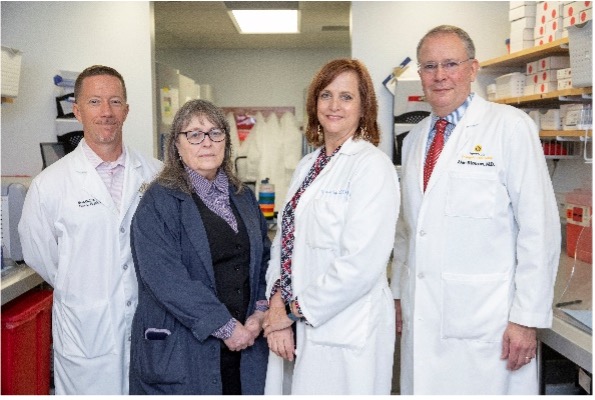 Deonni Stolldorf PhD, RN, is one of Vanderbilt University School of Nursing’s research scientists, and tenure-track Assistant Professor. Stolldorf’s research focuses on discovering how to best implement and sustain complex, multi-level, interdisciplinary healthcare interventions. Her frequent partnership with clinical researchers serves to advance both clinical interventions and the field of Implementation Science, with the goal to better understand the context of intervention implementation, customize approaches for success, and determine key drivers of sustainability. Currently, she’s working on implementing two interventions for heart failure patients in the emergency department, and a clinical decision-support tool to assist pharmacists with medication reconciliation. Stolldorf is also developing a measure to assess intervention sustainability, which will be available to future researchers also working to advance the field of Implementation Science.
Deonni Stolldorf PhD, RN, is one of Vanderbilt University School of Nursing’s research scientists, and tenure-track Assistant Professor. Stolldorf’s research focuses on discovering how to best implement and sustain complex, multi-level, interdisciplinary healthcare interventions. Her frequent partnership with clinical researchers serves to advance both clinical interventions and the field of Implementation Science, with the goal to better understand the context of intervention implementation, customize approaches for success, and determine key drivers of sustainability. Currently, she’s working on implementing two interventions for heart failure patients in the emergency department, and a clinical decision-support tool to assist pharmacists with medication reconciliation. Stolldorf is also developing a measure to assess intervention sustainability, which will be available to future researchers also working to advance the field of Implementation Science.
The successful use of interventions to achieve intended benefits is dependent on how they are implemented. “We know that translating evidence into practice is delayed by up to 17 years. By applying implementation science frameworks and principles and understanding the how, what, where and when of implementation and sustainability, we aim to reduce this gap and foster the implementation of evidence-based practices,” Stolldorf states. Tailoring the implementation of interventions to local context helps overcome potential barriers and augments existing facilitators. Developing implementation toolkits, capturing how interventions are adapted over time, and assessing the costs inherent to implementation helps inform future healthcare organizations with implementation and budgetary planning. This helps inform future implementation and budgetary planning, leading to enhanced outcomes and reduced risk of staff disillusionment. “Ultimately,” explains Stolldorf, “it is the patient who benefits when the outcomes from implementing the intervention are achieved.
When asked what aspects of her findings she deems the most interesting, Stolldorf said “that implementation strategies are not equal.” The team she works with is currently implementing a self-care intervention, and the research confirmed a need for adaptations in order to facilitate adoption and implementation. Additionally, her research indicates that adaptation must be ongoing, as the context of the implementation setting shifts, responding to local needs. Furthermore, her research recognizes the importance of integrating interventions into existing organizational processes for successful implementation. “My work to date has demonstrated that not all implementation strategies are equal. That is, some strategies are strongly associated with implementation, some are strongly associated with sustainability, and a few with both.”
The 6.2 million Americans who experience heart failure in the US[i] continues to drive the priority for effective implementation of interventions to improve outcomes. Developing implementation toolkits for heart failure interventions and medication safety protocols in diverse healthcare settings enhances quality of care and patient safety. By studying implementation and sustainability and developing frameworks and measures, Stolldorf and her team are impacting and advancing the field of Implementation Science.
Dr. Deonni Stolldorf would like to send her gratitude to the following collaborators: Dr. Sean Collins, Dr. Alan Storrow, Dr. Dandan Lui, Dr. Sunil Kripalani, Ms. Karen Miller, Ms. Cathy Jenkins and the research teams of GUIDED-HF and STRATIFY.
PCORI: PIR-1191
NHLBI: 1R01HL157596-01
[i] “Facts About Heart Failure in the United States” https://www.cdc.gov/heartdisease/heart_failure.htm
